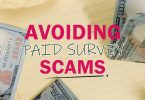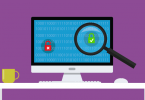Online survey scams remain a threat in 2022, and although more and more people are participating in the rewarding world of taking surveys for money (especially with the slowdown in the global economy), there are still concerns about phishing, data collection and dodgy payment procedures.
As such, it remains important to ensure that your own online survey taking experience is safe, secure and enjoyable.
In this guide, we will warn you of the most prevalent online survey scams we’ve seen here at SurveyPolice, and arm you with the steps you can take to avoid them.
Are online surveys for money safe?
First off, you might be wondering whether getting paid for online surveys is at all safe, considering that the internet continues to be rife with scams. Indeed, whether it’s a phishing scam, Nigerian scam or a survey jobs scam, there is a lot watch for.
Despite the bad apples however, reputable market research companies continue to operate legitimate survey sites, and taking surveys for money is something that hundreds of millions of people worldwide safely participate in, including in taking paid surveys for teens.
Online survey scam types
The following list reveals some of the most prevalent online survey scams online today, and how to protect yourself from them.
Phishing Scams
These types of scams involve scammers masquerading as a trustworthy company (usually via e-mail), in an attempt to acquire sensitive and personal information such as usernames, passwords, address details, and more. Legitimate survey companies are often targeted by these scammers and their logo and contact information is used in e-mail correspondence in an attempt to “phish” for information from users.
Warning signs to look for:
- poor spelling and grammar
- links that do not point to the survey company’s website (hover over a link and look in your browser’s bottom left corner to see where a link actually points to)
- e-mails going directly to your junkmail by your e-mail provider
- out of the blue requests to confirm your account
Nigerian Scams
It’s not that uncommon to receive a large unexpected check in the mail from a survey company. The trouble is, it might be fake!
If you haven’t taken any surveys with a survey site before, and you get a check with a letter asking you to participate in a mystery shop, product test, etc., destroy the check. This is not a real opportunity, nor a real survey job.
No matter how convincing it looks, the check will bounce. Whether you receive a strange check like this from a survey company or from something else, if you weren’t expecting it, question its authenticity. The check will often be accompanied by a letter which will provide instructions on wiring money to a Western Union account or will ask you to purchase some gift cards worth a small portion of the value of the check.
Even if you are in fact a survey taker for of the survey company referenced in the letter (such as Pinecone Research, who is frequently the target of such scams but is in fact, a very reputable survey site), if you receive a letter like this, you can be assured that it’s not actually from the survey site you’ve joined, but instead, is from a scammer.
Warning signs to look for:
- receiving an unexpected check for large sums of money (often $1000+!)
- check is accompanied by instructions to wire money. The letter’s subject matter may pertain to a “mystery shopping assignment”
- multiple logos from various companies featured in letter
- poor spelling and grammar
Information not kept private
When becoming a new member of an online survey panel, it’s important to ensure that you’re actually joining a website that is run by a true market research company, and not that of a marketing company. The difference may seem subtle, but in reality, it is huge.
Marketing companies are ones you need to watch out for. They do not actually conduct any online surveys, and will simply take any information you supply them with and will sell it to one or many third parties. When you hear people talk about how their inbox was inundated with SPAM after signing up for surveys, you now know that they mistakenly signed up with one of these companies.
The good news is that these types of websites are easy to spot.
Warning signs to look for:
- a missing privacy policy and/or terms of use agreement on the survey website
- a privacy policy that clearly states your information will be sold (this why skimming this is always a good idea!)
- outrageous promises such as, “make $150 per hour taking surveys!”
- no ‘about us’ page; zero information about the company who is behind the website
Legitimate survey sites are run by market research companies who employ researchers to conduct real surveys and they take the results of surveys very seriously. Your information will never be sold to a third party, as their credibility in the industry would disappear. Most trustworthy survey sites link to a corporate website where you can find more about the research company itself.
The following are considered some of the best surveys sites online; they have stellar reviews on SurveyPolice and are anything but scams!
- Tellwut – Earn e-gift cards for taking surveys, participating in fun community polls and more. Read 500+ reviews.
- YouGov – Earn cash and rewards for participating in surveys, with this highly regarded research firm. Read 300+ reviews.
- PaidViewpoint – Earn cash paid by PayPal for participating in surveys. Read reviews.
How you can stay safe
If you want to ensure that you’ll never fall victim to a survey scam, be sure to follow these simple steps:
1. Always search for privacy policies
If your key concern about taking surveys for money is the issue of data collection and distribution, looking for an official privacy policy is the first step in familiarizing yourself with the data collection process that a company takes part in.
Every country has its own policies pertaining to how data can be collected, stored, and shared by market research companies. Reviewing a survey panel’s official privacy policy will allow you to find out how your personally identifiable information (PII) will be used. Many survey sites agree to only use your PII for future survey eligibility, though some will share it with companies that are valued as trusted parties in the research organization they belong to.
2. Ensure contact information is easy to find
Another thing to be sure of is that the survey panel you’re researching has accessible and easy-to-find contact information.
If you have any questions or concerns, or wish to contact the survey site with a request you may have in regards to safeguarding your data, this should be simple to do.
Rule of thumb: if you can’t easily find a panel’s contact information, how trustworthy can they really be to pay you?
3. Look out for industry badges
Reputable survey sites are often members of official market research associations. Some of the most well-known associations are:
- ESOMAR
- Insights Association (https://www.insightsassociation.org/)
Each association has their own set of standards that survey panels agree to adhere to upon joining. For instance, the ESOMAR lists their own code of ethics, and the Insights Association follows a set of standards referred to as their official, “Marketing Research Standards”.
By validating that a panel is associated with one of these membership organizations, you can rest easy that your data will be collected, stored, and distributed in an ethical manner.
4. Other red flags
Although there may be a few bad eggs in the world of paid surveys, many red flags are easy to identify. For instance, nearly all experienced survey takers advise newcomers to be cautious of any survey sites that ask for any sort of payment or fees during the registration process. Reliable online panels don’t require any start-up fees, and never request payment information such as credit or debit card details.
It is also wise to steer clear of any online survey sites that are overloaded with advertisements. Not only is it a hassle to navigate through countless ads, but this could be a warning sign that they’re affiliated with questionable third-party sites. Professional survey panels usually present their visitors with a user-friendly interface that do not contain any sort of advertisements.
5. Dos and Don’ts: How to Proceed Without Worry
As long as the paid survey website you decide to become a member of is legitimate, your fears can be allayed. Here’s a basic quick list of do’s and don’ts to keep yourself safe:
- Don’t sign up with website who has contacted you by e-mail without your permission
- Do find paid survey websites via websites like SurveyPolice, that host a list of legitimate survey sites
- Don’t fall for a Nigerian scam; if you receive an unexpected check in the mail, simply discard it
- Do report such scams to your local authorities
- Don’t be naive and trust everyone online. If something seems a bit ‘scammy’, best to listen to your intuition instead of taking a risk
- Do your research before providing your personal information to anyone; read privacy policies and terms of use agreements so that you know what you’re getting into
By following the steps above, you can put your mind at ease and concentrate fully on taking rewarding online surveys!
Where to find safe online surveys
Online survey takers collectively complete hundreds of thousands of questionnaires every day, making them successful at taking surveys for money. It is understandable to have questions and concerns surrounding the online survey industry, but by following a few simple precautions, survey taking can be secure, fun, and a great way to earn additional income.
If you’d like to take surveys for money, be sure to consult the reviews on SurveyPolice posted by actual survey participants of these sites.







